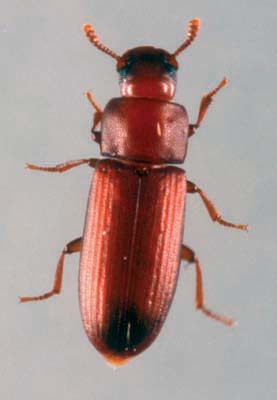
Adult red flour beetle, Tribolium
castaneum.
(Photographer: L.J. Buss, University
of Florida)
The red flour beetle attacks stored grain products such as flour, cereals, meal, crackers, beans, spices, pasta, cake mix, dried pet food, dried flowers, chocolate, nuts, seeds, and even dried museum specimens. This beetle is one of the most important pests of stored products in the home and grocery stores. It is found worldwide in cooler climates. In the U.S., it is more common in the southern states.
Although small, about 3.5 mm long, the adults are long-lived. The red flour beetle is reddish brown in color, and its antennae have a distinct 3-segmented club. It is very similar to the confused flour beetle which has antennae that are gradually club-like, the "club" consisting of four segments. The thorax of the red flour beetle has slightly curved sides, while in the confused flour beetle the sides of the thorax are more parallel.
The red and confused flour beetles live in the same environment and compete for resources. The red flour beetle may fly, but the confused flour beetle does not. Eggs, larvae, and pupae from both species are very similar and are found in similar environments. The eggs are white, microscopic and often have bits of flour stuck to their surface. The slender larvae are creamy yellow to light brown in color. They have two dark pointed projections on the last body segment. These beetles can breed throughout the year in warm areas. The life cycle takes from 40 to 90 days, and the adult can live for three years. All forms of the life cycle may be found in infested grain products at the same time.
Images
To save the Web-optimized images shown below to your hard drive:
|
Click to access Display and Print quality images. |
|
Click to access Display and Print quality images. |
|
Click to access Display and Print quality images. |